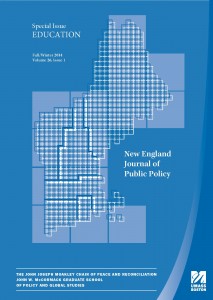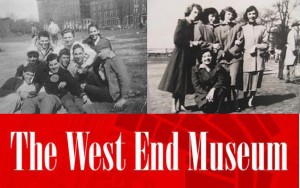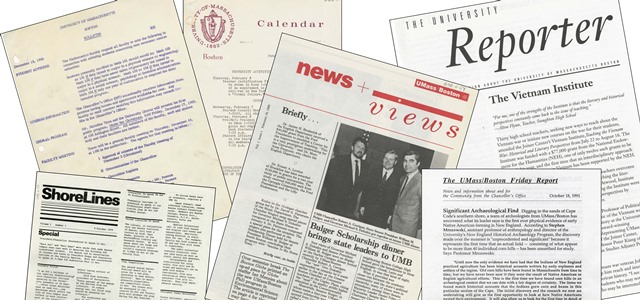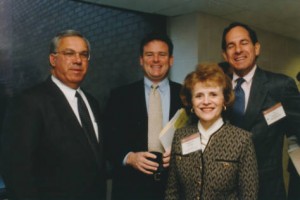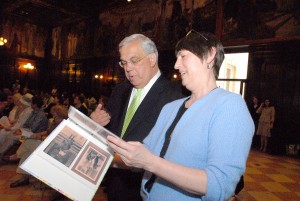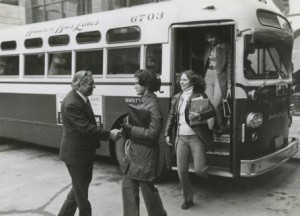
Chancellor Carlo Golino greeting students as they arrive on campus, circa 1974-1975. UASC-UAPHO-0004-0293-0006
University Archives & Special Collections in the Joseph P. Healey Library at UMass Boston is excited to announce that the University of Massachusetts Boston Publications Office photographs, ca. 1966-2000, are now open for research. Additionally, a number of photographs from the collection have been digitized and are available online at openarchives.umb.edu.
The UMass Boston publications office produced the majority of the university’s publications for many years. On August 1, 1998, Chancellor Sherry H. Penney reorganized several departments at the administrative level, creating one unit that was responsible for enrollment and communication services.
This collection includes photographs and slides from the publications office at UMass Boston from 1966 to 2000. The images in this collection deal broadly with issues related to the university, such as student and staff life, campus buildings, and events. Most people in the photographs are unidentified, though several individuals have been identified, including James Blackwell, Bernard Kramer, Governor Francis W. Sargent, Roger Prouty, Daisy Tagliacozzo, Herbert Lyken, Barbara Buchanan, and Bettina Harrison. Additional photograph subjects include Edward “Ted” Kennedy, Thomas P. (“Tip”) O’Neill, Martin Luther King III, and President Bill Clinton. Photographs of university events include the dedication of Phillis Wheatley Hall and an image from the Founding Day Convocation in 1966.
In the Special Arts Festival (1978) folder is a photograph of Massachusetts Governor Michael Dukakis presenting a document proclaiming the weekend of May 6-7, 1978, to be Arts Festival Weekend. In the photo, Governor Dukakis is pictured with Dean Michael Richards, Joan Hobson, and … a mime?
Promotional photographs of performers at the Harbor Festival in 1980 include the Children’s Ethnic Dance Co. of the Elma Lewis School, Krakowiak Polish Dancers, Boston punk band The Neighborhoods, choreographer Danny Sloan, performer Mr. Slim, and the Old Time Music and Vaudeville Revival.
We invite you to assist us in identifying faculty, staff, students, community members, and events by commenting on digitized photographs from the collection or by emailing library.archvies@umb.edu with information.
View digitized photographs from this collection here and view the finding aid for this collection. To make an appointment to view the collection, email library.archives@umb.edu.
These records were processed as part of University Archives & Special Collections’ Save Our History! campaign. As part of UMass Boston’s 50th anniversary, University Archives & Special Collections is calling for the transfer of founding documents and organizational records from all units on campus. These units include (but are not limited to) academic departments, administrative units, institutes, centers, and student groups. Read more about transferring University records to UASC.
